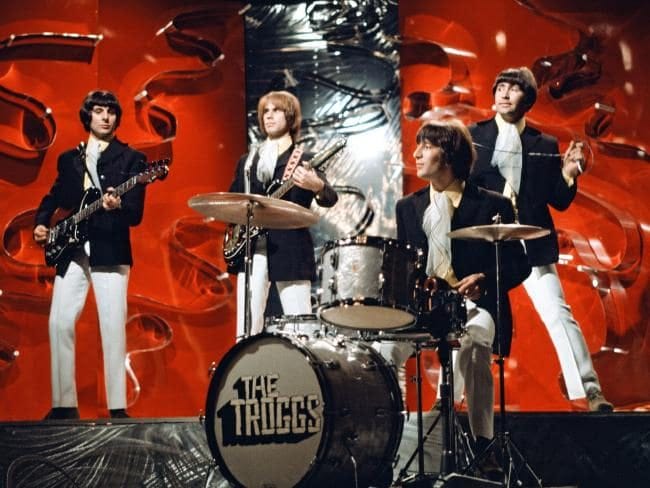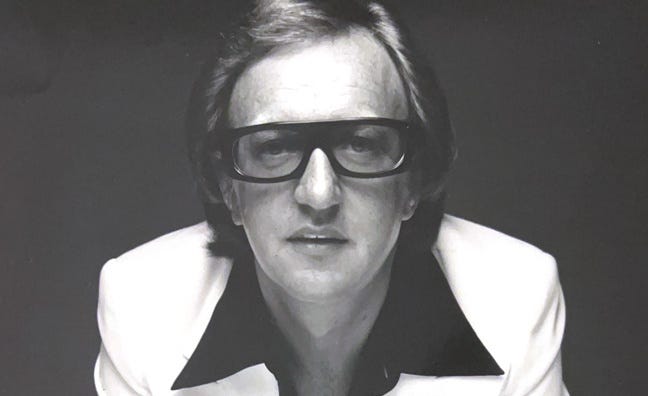Three Chords, Two AC30s, and an Ocarina
"Wild Thing" may be the dumbest song in rock, but it inspired legions of snotty teenagers and launched Jimi Hendrix's triumphant return to America. Here's how it all went down.
Was 1966 the pivotal year in pop?
Jon Savage’s 1966: The Year the Decade Imploded makes a strong case for it, pointing to epochal records by the Beatles, Bob Dylan, The Beach Boys and others. Fueled by tectonic changes in politics and culture—the civil rights and womens’ liberation movements, LSD, the pill, the yawning abyss of the Vietnam War—popular music burst through a perceptual wall. In the process, it changed from being the soundtrack behind events to being the event itself. Nothing of the sort had ever happened before, and it’s possible none will again. That year, a wealth of inspired rock songs bubbled up to seize the public’s attention: The Beatles’ “Eleanor Rigby,” the Byrds’ “Eight Miles High,” Bob Dylan’s “Visions of Johanna.”
Oh, and The Troggs’ “Wild Thing.”
Wait. Really?
Hear me out. If “Wild Thing” lacks the lyrical gravitas of “Sad-Eyed Lady of the Lowlands” or the game-changing production of “Good Vibrations,” the song has had far more influence than those three overdriven chords might suggest. In the years since its original release, “Wild Thing” has inspired multiple generations of rockers, proto-punks and ne’er-do-wells. It’s the song Jimi Hendrix set the stage alight with—literally—at the Monterey Pop Festival, his first major U.S. appearance. In the ensuing decade, the Ramones, Iggy Pop and the Buzzcocks would all cite the song—and more broadly the Troggs—as an influence. Later still X, The Creatures, Liz Phair, Cheap Trick, The Divinyls and others would all cover it.
A Half-Finished “Sexual-Kind-of-Feeling” Song
Of course, The Troggs didn’t actually write it. That honor goes to Chip Taylor, a country-and-western songwriter who also happens to be the brother of actor Jon Voight. In 1965, Taylor was asked to pen something “new and fresh” for The Wild Ones, then a more-or-less pre-fabricated house band at New York City’s Peppermint Lounge. With only a day in which to write and record a demo, Taylor booked time at a studio and hoped for the best.
“Wild Thing” may be rated PG by today’s standards, but in the mid-60s its sexual directness was a hard slap in the face of polite sensibilities. As Taylor later recounted in a 2012 interview:
“Because it was a sexual-kind-of-feeling song, I didn’t want to be embarrassed, I wanted to let myself sing it, so I asked [producer] Ron [Johnson] to turn the lights out when I got there.”
With the song only half-written, Taylor imagined himself with the titular Wild Thing and sang “whatever came to mind.” What ended up on tape was rough, halting, and primal, but the song had a special spark, and Taylor knew it. Rather than polishing his diamond in the rough, he called it done. The only embellishment came from Johnson’s fortuitous skill at whistling through air gaps in his hands, a primitive stab at a sound that would return to delight (or haunt) millions of listeners a few months later.
Considering the song’s later success, what’s odd about the Wild Ones’ recording of “Wild Thing”—which took place the very next day—is how terrible it is. Ditching the original song’s primal grind, “bluesified” by an obtrusive harmonica part, and perhaps most of all lacking Troggs’ singer Reg Presley’s inimitably halting / leering delivery, The Wild Ones’ version of “Wild Thing” justly sank without a trace.
So might too have the song disappeared beneath the waves, if it weren’t for a serendipitous meeting between Chip Taylor and English producer Larry Page. Already managing the notoriously unmanageable Kinks, Page had recently taken on The Troggs, a band from Andover, a small city southwest of London.
The band had none of the cachet of hipper bands from the capital. Nor, it must be said, did they have much in the way of raw talent. But what the band lacked in skill and polish they made up for with a thumping, driving delivery—the band’s original name was The Troglodytes—and a taste for raw, simple rock tunes. The Troggs had already released a single, “Lost Girl,” which had gone nowhere despite a frantic, fuzzed-out guitar break reminiscent of Dave Davies’ better efforts.
Well aware of the band’s limitations, Larry Page insisted they rehearse the song’s three chords until there was no chance of failure, then hustled them into the studio on the tail end of one of his own orchestra’s recording dates.
So primitive it’s almost eerie, with the guitar blasting out through not one but two Vox AC30s, The Troggs’ take on “Wild Thing” distills all of early Rock & Roll’s hypnotic lust and power into a two-and-a-half minute blast. It’s so dumb it’s genius, so genius it’s dumb.
Put down live to 4-track, the second take was the one. The only overdub was the infamous ocarina solo, played here by Larry Page’s musical director Colin Frechter. As Page drily put it in a 2013 interview:
“We did add the ocarina, which Colin Frechter played. He used to count the boys in. They weren’t a band that could count themselves in.”
A Chance Meeting, Plus…Tom Dowd as Evil Mastermind?
The song now enshrined on magnetic tape, Page set to work selling it. Herein lay a new problem: No one was interested. As he recounted in the same 2012 interview as Chip Taylor, he roamed the halls of the BBC seeking a sympathetic ear. Instead, he was greeted by the same answer over and over:
“I personally then walked around the BBC and everybody hated it. Everybody in the BBC hated ‘Wild Thing.’”
Dejected and angry, he left the building and was walking down Bond Street, wondering what to try next, when he ran into ex-BBC producer Brian Willey. Willey happened to be filling in that week as host of the popular Saturday Club program. After hearing Page’s story, he offered to play the as-yet-unheard song on the very next show.
If not for that chance meeting, The Troggs would likely have joined the untold thousands of garage bands consigned to history’s great cut-out bin. Instead, the band found themselves strapped to a rocket and headed straight to the top. Entering the charts in the summer of 1966, “Wild Thing” quickly went to #1 in the US and #2 in England, remaining in the Top Ten for some two months.
Oddly, the same recording was released on two labels in the States—Atco and Fontana—due to a legal dispute over distribution. Thus “Wild Thing” is one of only two singles to have simultaneously reached #1 on two recording labels, at least thus far.
Ready for some conspiracy theory catnip? Is there a difference between the two versions, you ask? Why yes, there is! Though both versions were taken from the same mono master tape, Atco’s release was somewhat altered, likely by legendary producer and engineer Tom Dowd. Employing audio forensics, some enterprising analysts speculate that Dowd employed heavier limiting, added a slight echo effect (also the tool used to create “fake stereo” mixes in those days) and boosted the low end a Decibel or two at 150Hz.
This is perhaps of mild interest to detail-obsessed vinyl enthusiasts, and likely no one else. But in a massive, potentially internet-breaking coincidence—or not—the only other song to hit #1 on two different labels, Eileen Barton’s 1950 release "If I Knew You Were Comin' I'd've Baked a Cake,” was the very first production credited to none other than…Tom Dowd.
The Jimi Connection
As for the Troggs, they had a good run for the next few years, despite their native limitations. But it was a live cover of “Wild Thing”—played a year after its initial release—that helped cement the song into the rock firmament forever.
That, of course, came during Jimi Hendrix’s epochal set at the Monterey Pop Festival in June of 1967. But as an avid reader of Dispatches From the Fringe, you already know that. If you need refreshing, visit The Most Famous Shot in Rock & Roll, on how a 17-year-old with a borrowed camera made history that night.
The years rolled on. The Troggs, their star long since having faded, would revisit “Wild Thing” a few more times themselves, each time to lesser effect. A 1975 reggae version would somehow fail to chart, and a 1993 rerecording featuring actor Oliver Reed and professional snooker player Alex “Hurricane” Higgins serves mainly as a cautionary against alcohol abuse.
Still, “Wild Thing” persists. It’s not hard to see why: Punk was but a dream of a dream in 1966, and slightly brutish bands like the Troggs, the Standells, and the Count Five were uncomfortable interlopers between the friendly world of pop and the darker undercurrents just then making themselves known: Teens slinging suggestive lyrics over snotty fuzztone riffs but still mooning about in matching suits and smiles.
Soon, their musical progeny would make their implicit menace clear. It would take a long time for the mainstream culture to accept these misfits into the fold, for bands like the Stooges to go from being drugged-out losers to scoring Nike commercials. But before all those weirdos and loners and straight-up sociopaths felt like they had a shot, there was a rough, untutored, somewhat hapless band from suburban England called the Troggs. And there was a song called “Wild Thing.”





I turned sixteen about a week before this timeless little tune dropped in the US, and already a Stones fan, this seemed like the tame response to their pissed-off, entitled plea in "Satisfaction." There wasn't much waffling or whining in Wild Thing, but more a statement of uncomplicated attraction. And to my sixteen-year-old ears, it sounded pretty tame, and kind of silly. (I mean, who used "groovy" unironically?) That was, until Hendrix turned up the heat under it, and made it a predatory declaration. It was great fun to read its history here, Seth, and to dip back into the lighthearted stretch just moments before the Summer of Love and all the other forces at play flipped our youthful world on its head.
Oh man, had no idea Wild Thing, which was on the British Invasion cassette responsible for slowly weaning me away from country and into rock, had its origins in the hand flute. Just never know where hand flute is gonna pop up:
http://www.lastwater.net/blog/2020/1/28/j06v6se0qi1v9nv9y6wlwuoimaow6k